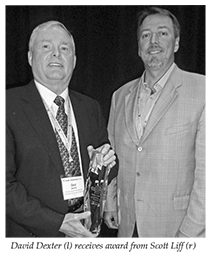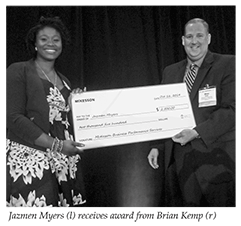The future of the diagnostic laboratory industry was on everyone’s mind as more than 500 people from clinical and anatomic pathology laboratories and related industries gathered in Washington, D.C., Oct. 15-17 for the 32nd annual Lab Institute.While it’s clear that the industry faces many challenges going forward, the tone was mostly upbeat as lab leaders discussed new opportunities for laboratories and the importance of the lab in providing patient care.
“Clinical laboratories have to evolve,” said BioReference Laboratories CEO Marc Grodman, M.D., in an opening keynote. “The lab industry has become payer-centric. We have to be provider-centric.”
This shift was one of many discussed during the conference, which considered how laboratories and other providers of diagnostic services can best respond to the array of challenges and opportunities that are confronting an industry that has traditionally been slow to adapt to change.
Much of the discussion centered on the need to define—or, in most cases, redefine—the roles that laboratories can and do play in a health care system that is in the throes of unprecedented change. “I see our role as educating physicians and payers,” noted Gail Marcus, CEO of Calloway Laboratories, who pointed to data transparency as a potential aid to labs seeking to fulfill this more consultative role that seizes upon the ability of laboratories to integrate and make actionable their vast storehouses of data.
“We are in the engine room of the health system,” Jim Crawford, M.D., Ph.D., chair of the Department of Pathology and Laboratory Medicine and senior vice president for laboratory services in New York’s North Shore-Long Island Jewish Health System (NS-LIJHS), told Lab Institute attendees as he detailed initiatives that position pathologists and laboratories as leaders in driving coordinated care.
A local clinical laboratory can either be a vendor to one or more accountable care organizations (ACOs) or can be an integral component of an integrated health system ACO. Both have risks, he said, noting that vendors can be underbid and components can be outsourced. An integrated independent laboratory system is in a potentially stronger negotiating position, he added.
The laboratory of choice for ACOs is one that has data-driven assessment of current utilization practices, acts as a consultant for medical care rather than just a vendor of laboratory testing, uses data to identify opportunities to improve patient outcomes and make patient care more affordable, and provides access to information for patients and providers.
The laboratory at NS-LIJHS provides a good example for labs to follow, as it has a proven record of offering ACOs and payers the data and partnership they seek. For example, the lab worked with a major employer in the Orlando area, along with the Florida Health Care Coalition, the University of Florida, Cognoscenti Health Institute, and the Florida Hospital Diabetes Institute to improve outcomes for 151 employees with diabetes and 75 employees with prediabetes. The lab worked with the employer on screening, enrollment, diabetes education, quarterly labs and biometrics, free glucose meters and strips, and telephonic support for employee attendance.
The pathology-led program resulted in initial improvement in clinical indices, medical claims data, and employee self-reporting, as well as a drop in health care costs per member per month. As the benefits of the 12-month program began to dissipate following its cessation, the employer created a more sustained strategy for diabetes wellness programming.
Other organizations are also being proactive in realigning their approach to diagnostic services. These include Albuquerque, N.M.-based TriCore Reference Laboratories. Now under the leadership of veteran ARUP Laboratories executive Khosrow Shotorbani, TriCore is moving toward a population health management approach and not underestimating the opportunities associated with engaging patients, not just providers. “We have the opportunity to change how medicine is delivered,” said Shotorbani during a panel discussion. “Patient engagement is the next blockbuster drug of the 21st century.”
Radical Payment Reform
Participants at Lab Institute also discussed challenges in reimbursement and discussed strategies for minimizing cuts in the future. While the sweeping changes to clinical laboratory payment enacted under the Protecting Access to Medicare Act (PAMA) may have been the lesser of two evils, the new system is far from perfect, industry representatives agreed.
Alan Mertz, president of the American Clinical Laboratory Association, emphasized that PAMA allowed the industry to stop further payment cuts under the Clinical Laboratory Fee Schedule until 2017. Before PAMA was enacted, Medicare was moving forward with plans to begin adjusting lab payment based on changes in technology, which most observers said would have resulted in additional reductions before 2017. PAMA halted this initiative.
“We didn’t have a choice,” said Mertz. “Given the choice of having your arm cut off in six months or two years, I would take the two years.”
Under PAMA, laboratories will have to report all non-capitated/bundled private market rates and test volume (per test) starting in 2016 and thereafter every three years for most tests. Medicare reimbursement rates will be calculated for each test based on weighted median of reported rates, with new Medicare lab reimbursement rates starting in 2017. Rate reductions will be phased in over six years, with a maximum possible reduction of 75 percent, according to Julie Scott Allen, representing the National Independent Laboratory Association.
Scott Allen questioned whether the alternative offered by PAMA is really better than what labs were already facing. “I call PAMA radical payment reform,” she said. “And while we had a lot stacked against us, was the choice to agree to a mandatory reporting system and potentially greater cuts really the right choice?”
Mertz and Scott Allen did agree on one point, however—the need for hospital laboratories to participate in the mandatory reporting system, which will be used to set lab payment rates going forward. Mertz said he believes the way the law is written, hospital labs will have to report. However, no one will know for sure until the Centers for Medicare and Medicaid Services issues details of the how the new system will work.
“If hospital labs are not included, we will have to seek a legislative fix,” he noted.
Side Box:
Dave Dexter Receives G2 Intelligence Laboratory
Public Service National Leadership Award
David Dexter, president and chief executive officer of Sonora Quest Laboratories LLC, a joint venture between Quest Diagnostics and Banner Health, is the 2014 recipient of the G2 Intelligence Laboratory Public Service National Leadership Award.
Sponsored by Kellison & Co. (Cleveland), the award was announced at this year’s Lab Institute on Oct. 16 in Washington, D.C. Scott Liff, Kellison’s president for business development, presented the award, which recognizes singular accomplishments that directly enhance patient care and the laboratory profession in one or more specific areas: basic and applied research, business creativity and innovations, public policy, and lifetime achievement. Dexter received the award in recognition of his business creativity and innovations.
For more than a decade, Dexter has led one of the most successful laboratory networks in the nation as the head of Sonora Quest and president and CEO of Laboratory Sciences of Arizona, which manages labs for the 13 Banner Health hospitals in Arizona.
According to G2 founder and executive editor Dennis Weissman, who announced the award, what makes Dexter’s success unique is the very special workplace culture of excellence, quality, and community service that he has built among the 2,600 employees he leads. In fact, Sonora Quest has received a number of awards for this culture, including Best Places to Work award for five consecutive years by the Phoenix Business Journal, winner of the inaugural Arizona’s Most Admired Companies Award by BestCompanies AZ and Arizona Business Magazine.
“Treating every employee with dignity and respect, Dex’s business philosophy is that you need work-life balance, and that requires having perspective—so no matter how significant the business challenge, if you can keep it in proper perspective, it won’t affect your leadership, health, or home life,” said Weissman. “And because he believes it’s a moral and ethical responsibility to give back to the communities in which we work, Dex requires that both he and every one of his senior team leaders either lead a major charitable event each year, participate in a charitable board, or do both as part of their executive development
Side Box:
Texas State University Senior Jazmen Myers
Receives G2 Intelligence Scholarship Award
Jazmen Myers, a senior in the clinical laboratory science (CLS) program at Texas State University in San Marcos, is the 2014 recipient of G2 Intelligence’s Scholarship Award for Excellence in the Clinical Laboratory Sciences, sponsored by McKesson.
Brian Kemp, executive director of client services, McKesson Business Performance Solutions, presented Myers the $2,500 scholarship award at G2 Intelligence’s 32nd annual Lab Institute, held Oct. 15-17 in Washington, D.C.
Myers, who has excelled academically, served as the junior representative to the Texas State CLS Society last year and is currently vice president for the Texas State CLS Student Society. She was one of only four junior CLS students to attend the state Texas Association for Clinical Laboratory Science conference last year and this year became the first Texas State CLS student to be elected as the vice chair of the American Society for Clinical Laboratory Science Student Forum.
According to Rodney Rohde, Ph.D., professor and chair of the CLS program, Myers demonstrates a high level of knowledge, motivation, and drive for educational excellence in the clinical laboratory sciences.
“Her personal attributes compl[e]ment her academic ability,” wrote Rohde in her nomination. “She is accurate and dependable while maintain[ing] a positive attitude toward her classmates and teachers. Jazmen also brings a fantastic sense of humor and integrity to the workplace and classroom. I believe she has great potential for future achievement with respect to her current motivation and drive to succeed in this field.”
Associated Data



